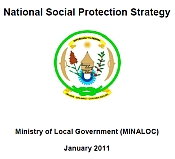
Last week, SURF’s partner organisations had the opportunity to meet and question the Right Honourable Andrew Mitchell, Secretary of State for International Development on the policy of the UK Department for International Development. In preparing for that meeting, we discussed the new National Social Protection Strategy in Rwanda published earlier this year which will have a profound impact on survivors of the genocide – in particular due to its effect on FARG (Government Assistance Fund for Genocide Survivors) .
I take the opportunity here to highlight some of the main points included in the NSPS as they relate to genocide survivors, which will serve as the foundation on which we will build our advocacy campaign over the months ahead.
- Article 14 of the Rwanda Constitution (2003), which is a driving force for the work and long-term vision for social protection in Rwanda, proclaims: The State shall, within the limits of its capacity, take special measures for the welfare of the survivors of genocide who were rendered destitute by the genocide committed in Rwanda from October 1st, 1990 to December 31st, 1994, the disabled, the indigent and the elderly as well as other vulnerable groups.
- The NSPS states that the “government is committed to supporting needy genocide survivors, and has a range of programmes in place to support the most vulnerable among them…Where possible, we will integrate support for specific vulnerable groups – such as genocide survivors – into other mainstream social protection programmes, and ensure that effective monitoring of their inclusion takes place.”
- All programmes within the NSPS aim to have a significant impact on the well-being of older people, vulnerable children, women, people with disabilities, genocide survivors and the historically marginalised.
- Vulnerable genocide survivors have been a priority for the government. The FARG programme has, over ten years, provided essential support over a range of services. Increasingly, however, we will ensure that genocide survivors can benefit from the range of mainstream programmes, and will pass FARG funding through those programmes, where appropriate.
- FARG will continue to provide support to genocide survivors to obtain loans so that they can take forward income generating activities. Groups of survivors will be formed and FARG will either provide co-lateral for a loan or will provide a percentage of the loan in cash. Over the next five years, however, we will identify how to mainstream the FARG income-generation programme in other programmes providing credit, such as the VUP Financial Services programme.
- FARG will continue to fund a range of programmes in education, health and income generating activities, to assist the most vulnerable genocide survivors. These will be undertaken in co-ordination with the relevant Ministries and through decentralized entities, as appropriate.
- FARG will transfer funds to the respective social protection programmes and monitor the incorporation of Genocide Survivors in the programmes, receiving regular reports from MINALOC (Ministry of Local Communities). It is expected that, once the social protection programmes are scaled up nationally, it should be possible to identify an increase in the number of genocide survivors receiving cash benefits from the government.
We will continue to post here further information on the changes in social protection as this becomes increasingly central to the work of Survivors Fund (SURF).
